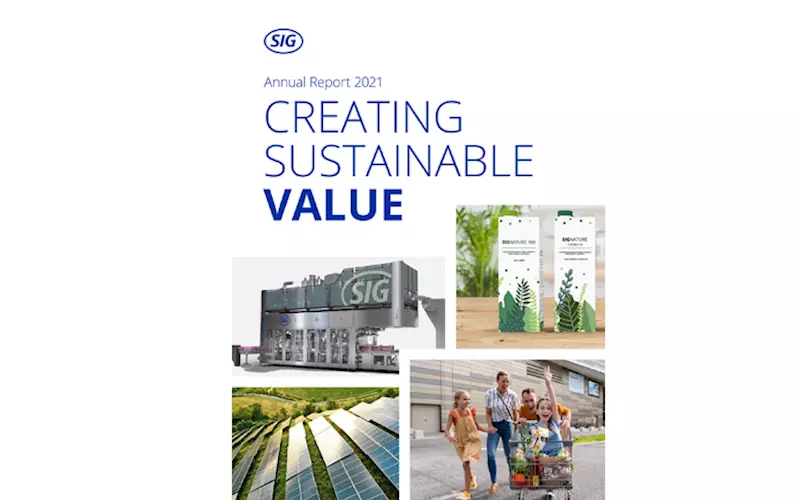SIG publishes combined corporate responsibility, annual report
For the first time, SIG has published a combined annual and corporate responsibility report for 2021. The report explores the company’s progress on the Way Beyond Good as part of its core business strategy, highlighting increased uptake of SIG’s most sustainable packaging solutions and the launch of new industry-leading sustainable innovations.
11 Mar 2022 | By Rahul Kumar
“We have set big ambitions on the Way Beyond Good for 2025 and beyond, and made strong progress in 2021,” said Samuel Sigrist, CEO of SIG. “Our relentless focus on sustainable innovation continues to deliver results for our customers and our business. Uptake of our most sustainable solutions has continued to rise in 2021. And both SIG Neo, our next generation filling machine, and Signature Evo, the latest aluminium-free solution for our packs.
This evolution in the company’s reporting responds to growing interest from investors in environmental, social and governance (ESG) topics. It also emphasises SIG’s longstanding ‘responsibility built in’ approach.
SIG’s commitment to go Way Beyond Good for people and the planet is built into the Corporate Compass, governance structures and core business processes. The company has reinforced this approach further by introducing an ESG performance measure in its short-term incentive plan in 2021.
Key elements of SIG’s strategy and progress on the Way Beyond Good are included throughout relevant sections of the annual report. The report also offers detailed ESG disclosures for experts in a dedicated CR Report chapter that describes SIG’s CR governance as well as management approach, performance and targets related to its most material environmental and social issues.
Meanwhile, in 2021, the company sustained strong revenue growth throughout the year. “Our performance globally not only reflects the resilience of our business it is also the testimony to our teams who have worked tirelessly to ensure flawless service and an ongoing stream of innovation for customers,” Sigrist said.
The strong top line growth was accompanied by an increase in the adjusted EBITDA margin which was achieved despite higher raw material costs in the second half of the year. In recent years, we have demonstrated our ability to maintain best-in-class profitability in the face of foreign exchange as well as raw material headwinds.
In 2021, the company continued to place a significant number of fillers with new and existing customers across all regions. It also continued to invest in its manufacturing base. “Our new Asia Pacific plant in Suzhou, China was operational from the start of the year and is progressively ramping up its capacity. In April, we announced the construction of a new plant in Mexico which will come onstream in early 2023 and will enable us to serve our North American customers better and faster,” he added.
SIG's 2021 highlights
- Platinum rating maintained in the latest EcoVadis assessment, scoring among the top 1% of participating businesses
- On track to meet target of 30% women in leadership positions by 2025, with 20% female leaders in 2021 and one third female Group Executive Board members as of January 2022
- SIG Neo next generation filling machine designed to cut the carbon footprint of filling and packing by 25%, and further reduce our industry-leading waste rate of 0.5% or less
- 21% increase in sales of SIG’s most sustainable Signature portfolio solutions in 2021
- Signature Evo, the world’s first aluminium-free full barrier aseptic carton solution, developed for launch in early 2022
- Over 660 million SIG packs now sold with Aluminium Stewardship Initiative (ASI) label and SIG remains the only carton producer to offer packs with ASI-certified aluminium
- 10.6 billion litres of nutritious food and drinks that contribute to a balanced diet and lead to better health (as defined by the independent Health Star Rating System) delivered in SIG packs in 2021
- Carbon neutral production maintained with 100% renewable energy used to make packs
- 74% reduction in Scope 1 and 2 emissions, and 20% reduction in Scope 1, 2 and 3 emissions per litre of food packed (since 2016), staying on track to achieve 1.5oC science-based targets
- 100% paperboard purchased with FSC certification from January 2021











 See All
See All